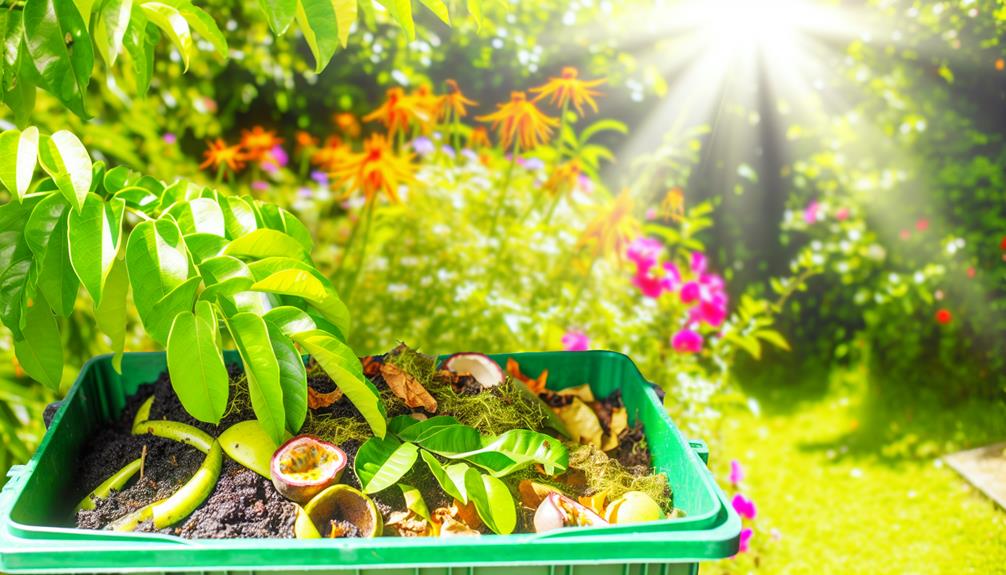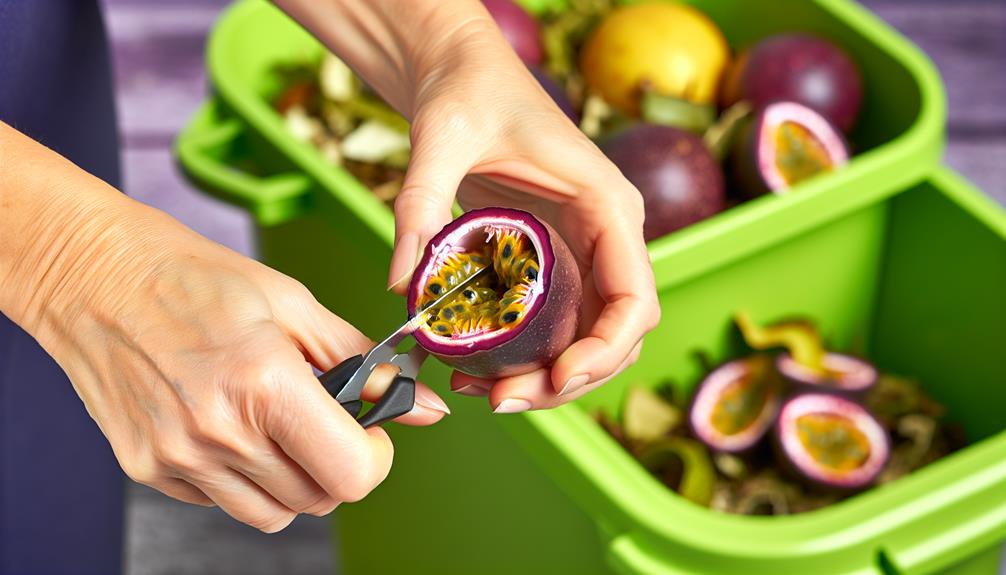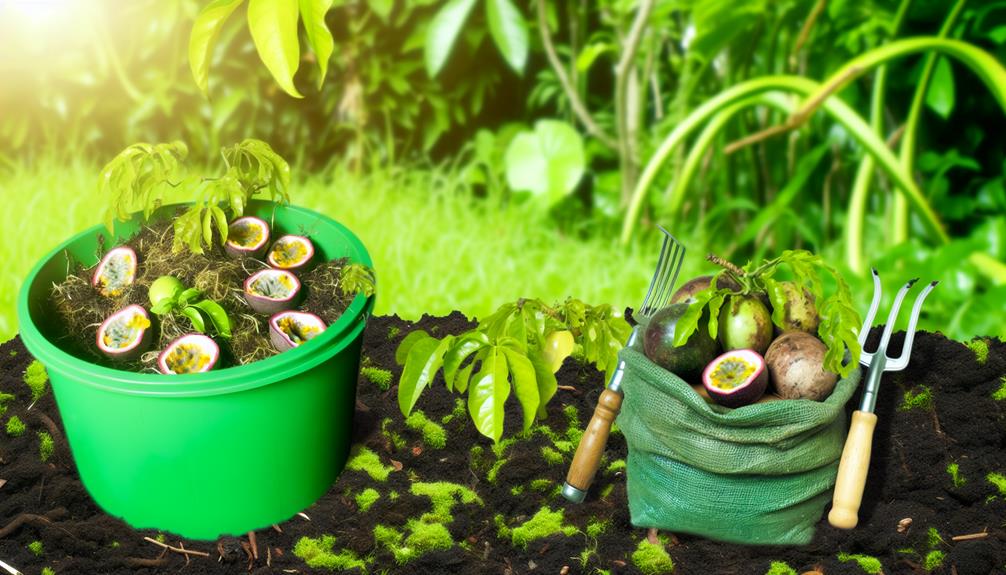

Yes, you can compost passion fruit. Start by cutting the fruit into smaller pieces and peeling away the tough outer skin. Extract and crush the seeds for faster decomposition. To avoid issues like mold and odor, balance the moisture and acidity by adding carbon-rich materials like dried leaves or paper.
Place the fruit in the center of your compost pile to maximize breakdown, and regularly turn the pile to keep it aerated. Use a well-ventilated compost bin and monitor moisture levels to guarantee a healthy compost pile. Follow these tips, and you’ll enhance your composting efforts effectively.
Composting passion fruit offers numerous benefits, including enriching soil with essential nutrients and reducing organic waste. When you compost passion fruit, you’re not just disposing of kitchen scraps; you’re creating a valuable resource for your garden.
The fruit’s peels and pulp break down into a rich, organic matter that enhances your soil’s nutrient enrichment. This process provides essential nutrients such as nitrogen, potassium, and phosphorus, which are important for plant growth.
In addition to nutrient enrichment, composting passion fruit also improves soil structure. By integrating organic matter into your soil, you enhance its texture, making it easier for roots to grow and for water to penetrate. This leads to better drainage and aeration, which are crucial for healthy plant development. You’ll notice that your plants will thrive, producing more robust flowers, fruits, and vegetables.
To maximize these benefits, make sure you balance your compost pile with other organic materials like leaves and grass clippings. This balance helps maintain the right moisture and temperature levels, ensuring efficient decomposition.
Also Read: Can You Compost Celery?
While composting passion fruit can be highly beneficial, you might encounter a few challenges along the way. One issue is mold growth. Passion fruit’s high moisture content can create a breeding ground for mold, which might spread to other compost materials. This mold isn’t always harmful but could lead to unpleasant odors and an unappealing compost pile.
Another challenge is fruit acidity. Passion fruit is quite acidic, and adding too much of it to your compost can lower the pH balance, making it less hospitable for the microorganisms that break down organic matter. This can slow down the composting process and reduce the quality of your finished compost.
To help you manage these challenges, here’s a quick comparison:
| Challenge | Solution |
|---|---|
| Mold Growth | Mix with dry materials |
| Fruit Acidity | Balance with alkaline items |
| High Moisture | Add brown, dry materials |
| Odor Issues | Turn compost regularly |
| Slow Breakdown | Monitor and adjust pH levels |
Also Read: Can You Compost Basil?
To get started, cut the passion fruit into smaller pieces to speed up the decomposition process. This step is essential as it increases the surface area, allowing microorganisms to break down the material more efficiently. Use a sharp knife to slice the fruit, including the rind and the pulp.

Next, focus on fruit peeling. Sometimes, it’s helpful to peel off the outer skin of the passion fruit, especially if it’s particularly tough. The peeling will decompose faster and integrate more readily into your compost pile. However, you can leave the peel on if it’s already soft and beginning to break down.
Now, let’s talk about seed extraction. Passion fruit seeds are quite hard and can take a long time to decompose. If you want to speed up the process, consider removing the seeds and either discarding them or using them in another way. You can also crush the seeds slightly before adding them to the compost, which will help them break down more quickly.
Incorporate the prepared passion fruit pieces into the center of your compost pile to promote ideal decomposition. By placing them in the middle, you guarantee they benefit from the higher temperatures and microbial activity found at the core. This placement accelerates the composting process and helps break down the passion fruit more efficiently.
Passion fruit, being a nitrogen-rich compost material, complements carbon-rich materials like leaves, straw, or cardboard in your pile. To maintain a balanced compost, aim for a ratio of about three parts carbon to one part nitrogen. Mix the passion fruit pieces thoroughly with other compost materials to avoid clumping and ensure even decomposition.
As you add passion fruit to your compost, remember to monitor moisture levels. Passion fruit has a high water content, which can increase the moisture of your pile. Make sure the compost isn’t too wet or dry. Aim for a consistency similar to a wrung-out sponge.
Turn your compost regularly to aerate the pile, helping to speed up the composting process. This practice ensures your pile remains oxygenated and facilitates the breakdown of all compost materials, including passion fruit, into rich, fertile compost.
Also Read: Can You Compost Barbecue Sauce?
Maintaining a well-balanced compost pile requires a few effective strategies to guarantee efficient decomposition and nutrient-rich results. First, make sure you’re using a well-ventilated compost bin. It helps regulate moisture and air flow, important for breaking down organic materials like passion fruit effectively. Without proper aeration, your compost can become too wet or dry, slowing the decomposition process.

Next, practice good aeration techniques to keep your compost healthy. Turn your pile regularly, ideally once a week, to introduce oxygen. This encourages microorganisms to thrive, speeding up the breakdown of your compost materials. If turning the pile is challenging, consider inserting aeration tools or pipes to facilitate air circulation.
Balance is key in composting. Mix green materials (like fruit scraps, coffee grounds, and grass clippings) with brown materials (such as dried leaves, cardboard, and straw). A good rule of thumb is three parts brown to one part green. This balance helps maintain the right carbon-to-nitrogen ratio, essential for efficient composting.
Lastly, monitor the moisture level. Your compost should be as damp as a wrung-out sponge. If it’s too dry, add water; if it’s too wet, mix in more brown materials to absorb excess moisture.
Following these tips will ensure a thriving compost pile.
Yes, passion fruit can attract pests to your compost pile. For effective pest control and avoiding attracting wildlife, you should bury the fruit deeply under other compost materials. This helps maintain a balanced, critter-free compost environment.
You’re wondering if it’s safe to compost passion fruit seeds? Don’t worry, it’s perfectly fine! Although seed germination might occur, the overall composting process guarantees seed decomposition, creating nutrient-rich compost for your community garden.
You’re curious about the decomposition rate of passion fruit in compost. Typically, it takes a few months for the organic matter to break down, but this can vary based on your composting conditions. Keep your compost balanced!
Composting passion fruit can alter your soil’s acidity. To maintain pH balance, mix it with other compost materials. You’ll help create a thriving garden community with balanced, nutrient-rich soil that everyone will admire.
To compost passion fruit effectively, you need to maintain ideal moisture levels and temperature control. Guarantee your compost pile is damp but not soggy, and keep it at the right temperature to promote healthy decomposition.
Composting passion fruit is a smart way to enrich your soil. Make sure you’ve chopped it into small pieces to speed up decomposition.
Balance the fruit with other compost materials like leaves or paper to maintain a good carbon-to-nitrogen ratio.
Turn your pile regularly for aeration, and monitor moisture levels to avoid mold.
With these tips, you’ll transform passion fruit waste into valuable compost, enhancing your garden’s health and productivity.
